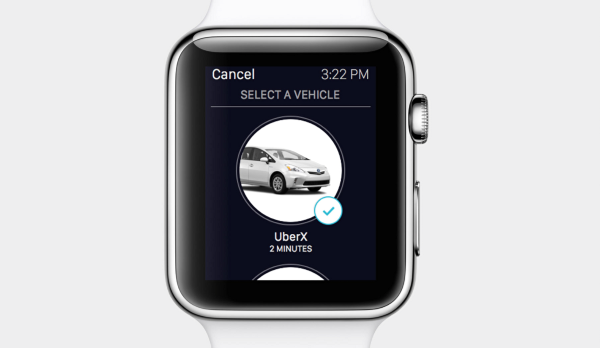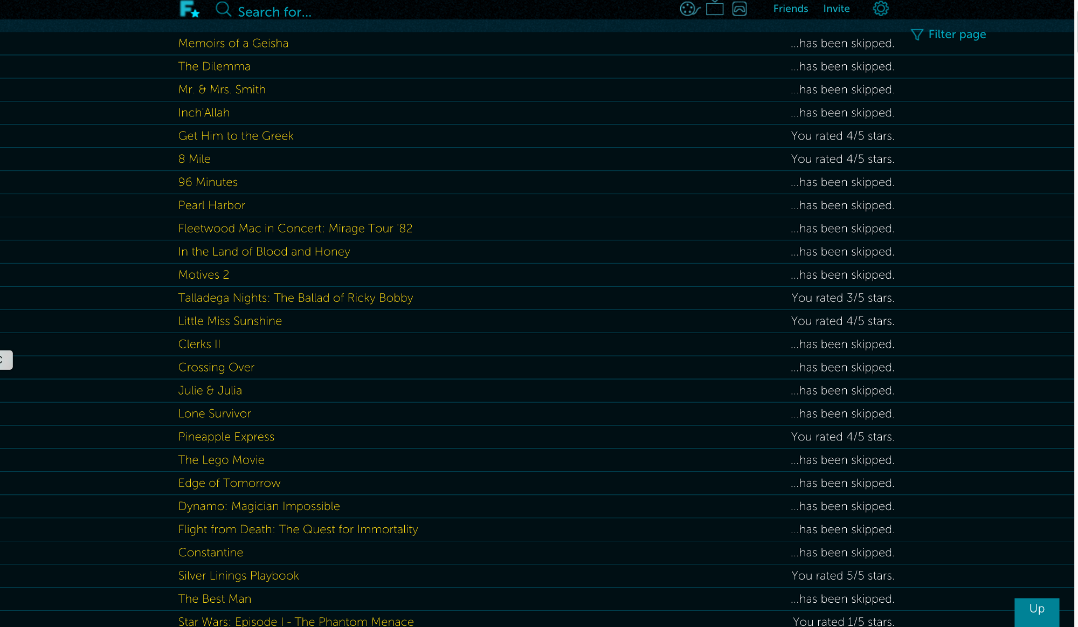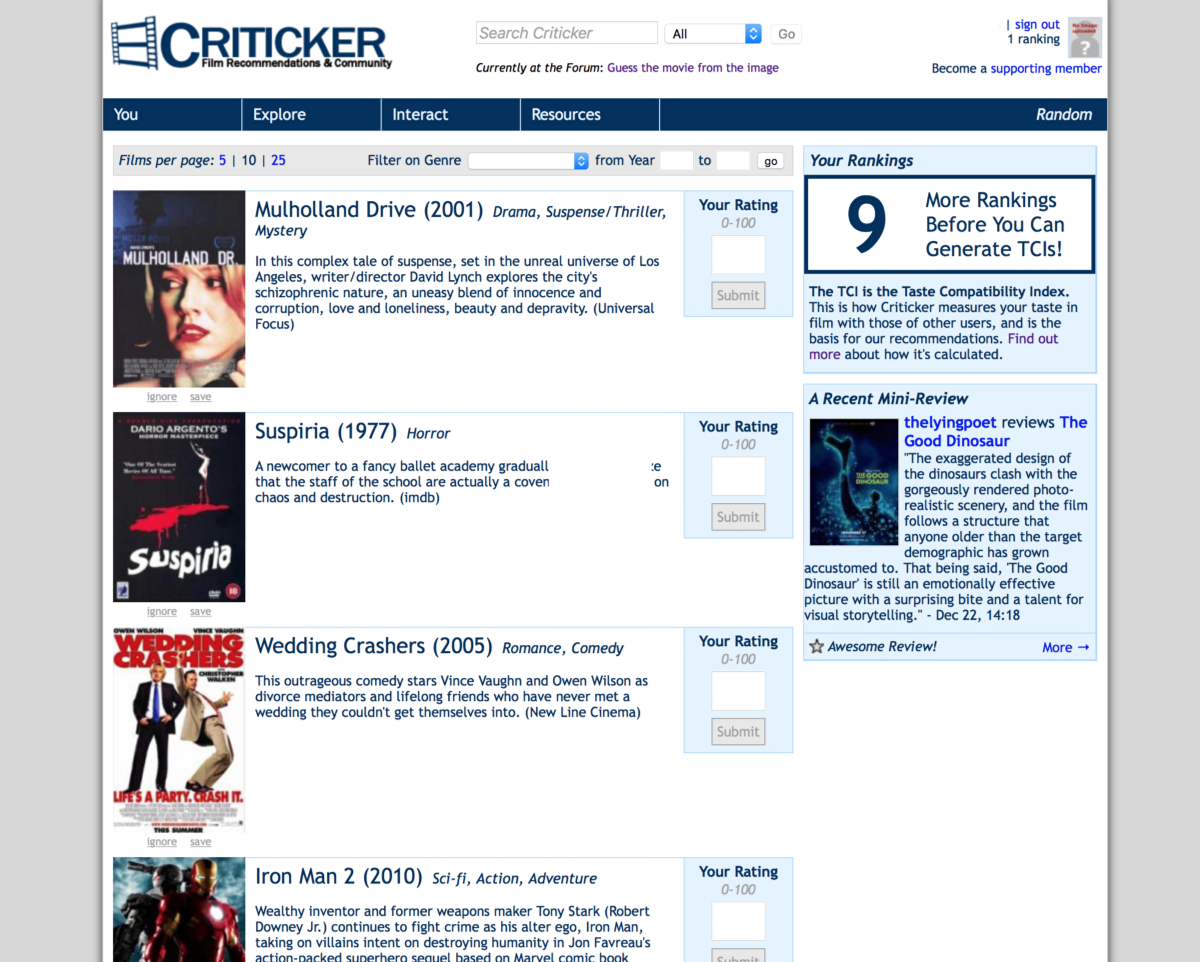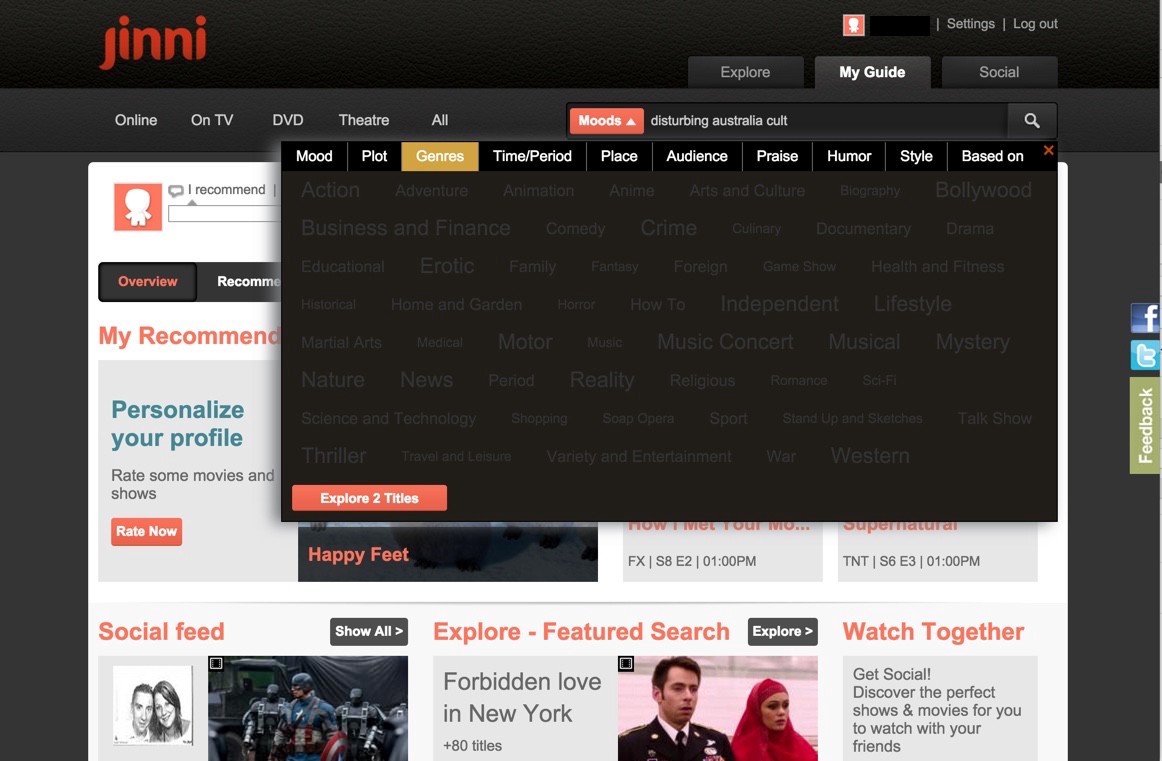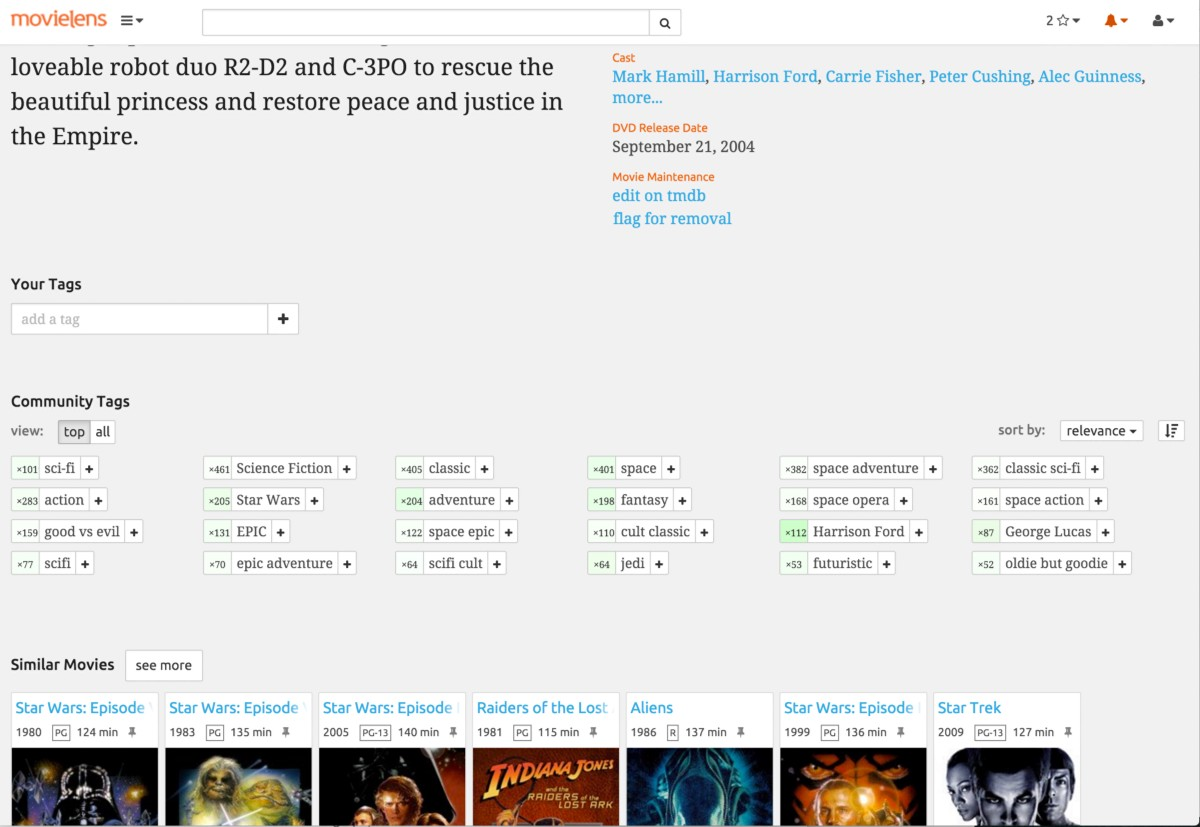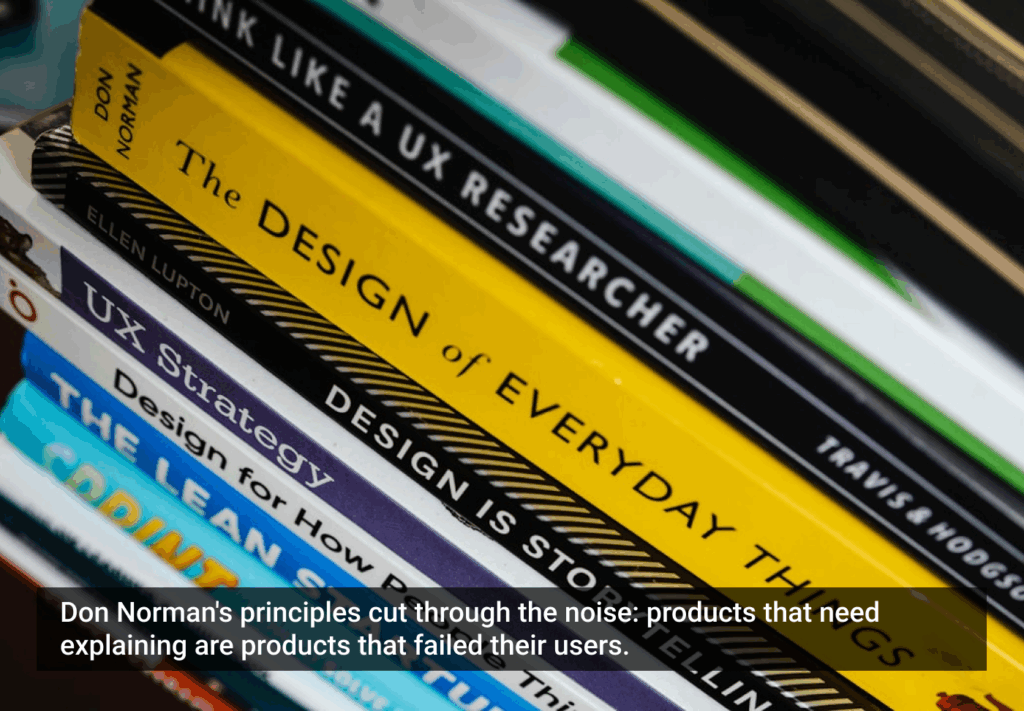Just about every tech company is making experience a priority and acting on it. Apple recently had the most profitable quarter in history. Uber is currently the most valuable venture-backed private company in the world. And entire economies have been born out of the experience of having more convenience. But recommendations are behind.
“I think subconsciously people are remarkably discerning. I think that they can sense care.” — Jony Ive
For example, we’re not seeing movie recommendations really catch on with the world. Sites like Jinni and Foundd didn’t make it. What’s the hold up? Putting aside movie recommendation ‘accuracy,’ the missing key is making recommendations a great experience.
A record-setting company’s app on a record-setting company’s watch
Here are some characteristics of movie recommendations today, along with the negative feelings you have associated with them:
Endlessness (& Overload)
Most movie recommendation sites give you the option to rate movies on a one to five star scale. I know, I know—the promise here is that the more you rate, the better your movie picks will be.
Soon after you start rating, you’ll notice that the list of movies to rate never ends.It’s a marathon that you can’t finish. But they tell you to keep going. As Janel Torkington insightfully puts it, an endless list “robs the user of a sense of finality.” Fatigue sets in and you quickly find rating more movies to be mundane.
Think about the sense of accomplishment when you finish a hard task. Now think about one that you can never get done. It’s not a delightful feeling.
Immaterial Content (& Tedium)
Inside the list of movies that they tell you to rate, you’re being presented with a lot of movies that you’ve never even seen.
Obscure or niche flicks appear at the top, making you skip them before getting to something relevant to you. I was presented with Bridget Jones: The Edge of Reason and Hitman Heart: Wrestling with Shadows upon logging on to Foundd for the first time.
We need to honor users’ expectations and provide a seamless, easy experience for them
Taken a step further, when you find movies that you’ve seen before, they’re often ones that you saw years ago. Remembering and then rating them becomes a bit of a brain exercise…a seam taking your focus away from the product for a moment.
And, since your recollection of the movies are likely fuzzy, you end up making educated guesses on your score of them. Your recommendations become more a byproduct of guesses and less of concrete data. So in the end you spend more time around movies that aren’t as relevant to you as they could be.
Obvious Incongruity (& Dissonance)
Then come your recommendations. The results that you put in effort to receive. Some sites will recommend even before you say a word about your movie preferences. Almost as striking, they’ll give you a big list of recommendations after just one or two ratings.
The problem here is that not enough is known about you to give you some picks that make sense. In this example, Donnie Darko was the only movie I rated (I gave it a 95).
OK, Mulholland Drive is a fit here. We can see the similarities. Impressive.
Next: Suspiria. Well…it sort of makes sense. There are some parallels, possibly.
Finally: Wedding Crashers and Iron Man 2. How do these movies relate to Donnie Darko? It feels incongruent. We expect good results but we get something that looks like it was picked from a hat. Since picks like these actually seem to be completely opposed to our intent, we are more likely to go back to what we’re used to—spending time sifting and sorting through a sea of options. The product fails to serve its purpose.
A Toolbox of Features (& Inconvenience)
A solution may be to let you manually tweak every movie trait imaginable to conduct a search—your own personal God Mode.
That’s not the answer either because it results in inconvenience. Your primary goal in using a movie recommender is to just press play on that movie that suits you. You don’t want to be trading in precious minutes of your leisure time to (unnecessarily) interact with an interface even more.
An example of God Mode being tried is Jinni. Before the shutdown, there were 67+ features, filters, options, specializations, and more available for users to play with. Some examples: ‘Now on TV for me,’ ‘Entertainment Personality,’ ‘Preferences,’ ‘Story Tuners,’ ‘Why close to you,’ ‘My Guide,’ ‘The Watch Wall.’
Getting a user inside a movie they enjoy became overshadowed by the process of finding one.
“Our goal is to try to bring a calm and simplicity to what are incredibly complex problems so that you’re not aware really of the solution.” — Ive
Remember, our technology is pushing our expectations. We can get a bag of groceries at the push of a button. The ideals of The Convenience Generation are spreading like wildfire outside of their Gen Y origins. We now expect this level of convenience outside of the lexicon of ‘Apps’, including recommendations.
The Surface Level (& Detachment/Disappointment)
Tags attribute traits to a movie. They’re extra useful because they’re standard enough for a computer to be able to understand, so a website can use algorithms that play with them.
Tags have the potential to be powerful, but the problem is that they’re usually very general. ‘Sci-Fi’, ‘Action,’ ‘Space,’ ‘Good vs. Evil.’ We as humans don’t respond to a movie just because it has any of these traits.
Instead, how do individuals respond and react to those traits? What does that action entail? How is Good and Evil portrayed? And once you have those answers, what about when we blend these specifics together?
In some cases, though, that blend doesn’t make enough of a difference. Take Star Wars: A New Hope and Star Wars: The Phantom Menace.
The tag-based formula is there. Phantom Menace is Sci-Fi. It has a character named Anakin Skywalker in it. On the surface level, it’s Star Wars being Star Wars. As such, if you indicate that you like A New Hope, the computer-based recommenders take up a prominent part of the frame to suggest it to you. But real humans don’t take the two movies as an equal equation. That part of the frame could be taken up by a movie suggestion based more in human ideals.
What makes Star Wars ‘Star Wars’ is how we feel when we watch and listen to its characters and their stories. If Star Wars is getting it right, it means that the characters are giving us enough to invest in them. To feel along with them. To care so much that we desperately want to see the continuation of their stories after 32 years. This transcends moving pictures on the screen and 1s and 0s inside a computer.
We need to begin to make the tags identify and recognize the shades of this kind of human to human connectedness. We need to improve on uncovering the true things that make people like movies. And we need to honor users’ expectations and provide a seamless, easy experience for them. I think And Chill is starting to do just that.
Image of happy young television addict courtesy of Shutterstock.


